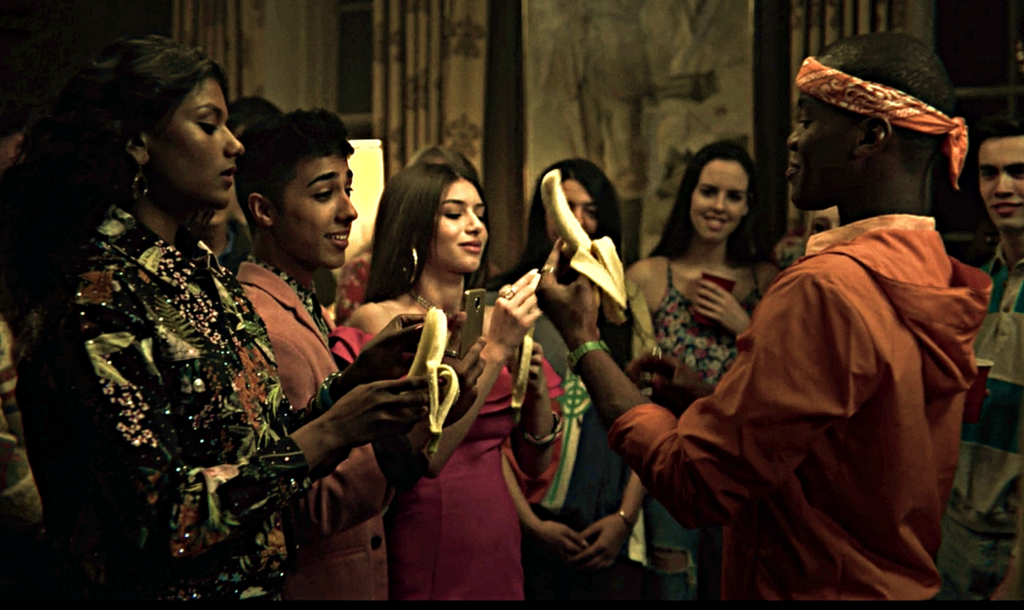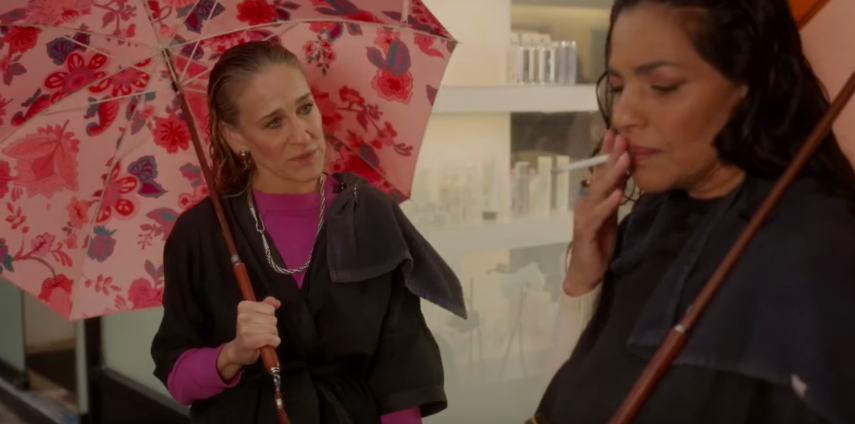Books & Culture
Netflix’s “Sex Education” Knows That Boners Are Serious Business
The show breaks ground by showing how young men make sense of their bodies and the expectations placed on them

A boner is a funny thing. Funny-ha-ha, yes, as many raunchy comedies remind us every now and then. But also funny-weird, in that it’s still treated as some kind of mysterious and monstrous apparition that both their observers and owners — especially their owners — don’t always know what to do with. Both arrow and target, a boner (especially of the inadvertent kind) is ripe for comedy and horror alike.
Netflix’s aptly-titled show Sex Education is keenly aware of this, so much so that it anchors its first episode on precisely what’s so funny and so disquieting about an erection. In so doing, this series about nominally British high schoolers takes well-worn tropes of its genre (Does he like me? Am I inadequate? Why am I ashamed of what I’m feeling?) and situates them squarely within the hormonal urges of teenagers. Sex is no mere subplot; it is the gravitational force at the heart of the show’s storytelling. It is also, not coincidentally, the gravitational force at the heart of high school. But Netflix gave the show a TV-MA rating, as in “may be unsuitable for children under 17,” despite the fact that it’s dealing with teenage-specific concerns. It’s a stark reminder that stories about young adults that skirt around the pleasures and perils of sex do a disservice both to its characters and their intended audience.
Here’s where Sex Education breaks ground. It takes young male sexuality seriously; it knows boners aren’t mere punchlines. They’re sometimes questions, other times answers; sometimes confessions, other times announcements. By diving into how young men make sense of their bodies as they come into their own, the series wades into conversations about toxic masculinity and homosocial socialization without ever sounding that pedantic about it. These young men may be more than their boners, but their boners end up being the perfect way to understand them.
These young men may be more than their boners, but their boners end up being the perfect way to understand them.
The first episode of Sex Education does provide the promised education, but the opening scene is all sex. A young naked woman is straddling an inordinately bored young man. They’re in his bedroom, and it’s clear this has happened before. “Do you want to cum on my tits?” she asks him, while riding him. He’s indifferent but agrees, only to have her retract her invitation; she got a rash last time. Better he finish from behind. But while her orgasmic moans cap off their athletic encounter, the young man barely musters any enthusiasm. He chooses to fake it and be done with. Alas, he’s not convincing enough: she asks to see the condom, which, as we can see ourselves, is empty. These various details (the close-up of a used condom, the wide-frame that does little to cover the girl’s nakedness, the near-laughable sex talk) do a lot to set this hyper-raunchy John Hughes-ian take on contemporary teens apart from its more prudish compatriots.
Sex Education makes the likes of Riverdale, with its cruising storylines and Abercrombie & Fitch aesthetic, look like an after-school special. And it does so, in that very first episode, by making boners its central concern. We first meet Otis (Asa Butterfield) as he gets up from his bed and does what’s become his daily routine. He takes out a porn magazine, some tissues, and a bottle of moisturizer, some dollops of which he leaves on the now crumpled up tissues. “I’ve noticed you’re pretending to masturbate,” his mom tells him later, “and I was wondering if you wanted to talk about it.” He most definitely does not. For Otis’s mom is a local sex and relationship therapist (played by Gillian Anderson), whose gleeful disregard of all prudishness — she asks her patients things like “tell me your earliest memory of your scrotum?” and “how are you getting along with your penis?” — has, perhaps, left Otis quite unable to healthily indulge in self-pleasure. In short: he can’t masturbate and he’d hoped his mom wouldn’t notice. Yes, he can get boners, but as he tells his (gay) best friend Eric (Ncuti Gatwa), he just waits for them to go away. Eric’s response? “That’s super weird.”

No one-time gag or mere punchline, Otis’s sexual phobias drive much of his story through the show’s eight episodes. Moreover, his sexual inexperience doesn’t handicap the budding sex therapist business he ends up running at school with his crush Maeve (Emma Mackey). His first patient? Adam, the young man from that first scene, who ends up asking for Otis’ help during a Viagra-induced emergency in the middle of the day. Here’s where the show’s fascination with boners breaks new ground. It’d be enough for the show to use Adam’s giant boner (“Sorry, it’s like a third leg!” Maeve quips) as a funny joke. It’d put Sex Education alongside the likes of American Pie and There’s Something About Mary, raunchy comedies that ask you to laugh at men and their ill-advised penis decisions. Here, though, both Otis’s phobias and Adam’s cluelessness are used instead to illuminate conversations about what’s expected of young men. At opposite ends of the male teenage spectrum (Otis is kind, Adam is gruff), the issues these two have with their own bodies and boners are treated with equal care. Adam may be a school bully who relishes shoving Eric in the hallway and calling him “Tromboner” (a nickname that’s stuck years after he was caught with a semi while playing the french horn), but the show still goes out of its way to frame his toxic masculinity in ways more interesting than merely getting us to laugh at his “two coke cans”-dick (the show’s words and, er, visual, not mine).
Adam’s girlfriend tells Maeve that he can be really sweet in private. (In public, during this scene, he’s mock-fucking his male friend out on the lawn.) But the pressures of being the headmaster’s kid, and not a bright one at that, have stunted him. The only way to assert his space in the world is to bully his way around, even if he knows there are snickers about his big package. “I wish I could be a normal kid with a normal dick,” he tells Otis, “and a normal dad.” Otis can relate. Having a sex guru as a mom and another sex therapist as a dad has made hi. too self-aware of his body, to the point where jacking off is a painful experience that triggers family trauma memories. Adam’s aggressiveness has numbed him, and Otis’s restraint has made him hypersensitive. But they’re both examples of how the expectations of masculinity — not only, but especially, in matters of sex — can take its toll.
The recurring focus on boners in that first episode is indicative of a welcome approach to sex. While seemingly self-explanatory and quite blunt, in ways both figurative and literal, boners, the show tells us, demand to be taken seriously. The reason they’re funny and disquieting is because we’ve been told they’re embarrassing (visible proof of urges we may otherwise want to keep secret, for example). There’s a stigma about them; this despite the fact that more often than not they’re involuntary. Moreover, the show acknowledges that we need not shy away from talking about (and seeing!) dicks on screen. If Otis and Maeve’s therapy sessions depend on anything, it is the conceit that the more open you are about sex, the healthier your life can be. It’s no surprise to find the show returning to said unwelcome boners in its final climactic moments.
While seemingly self-explanatory and quite blunt, in ways both figurative and literal, boners, the show tells us, demand to be taken seriously.
Watching Sex Education is a joy precisely because it mines boners for all their worth — be they low-hanging puns or complex insights into crippling self-doubt — but there is more to the show than its refreshing take on dicks and male sexuality. Over the course of its first season we’re treated to stories about unwanted pregnancies, female self-pleasure, consent, and hate crimes with such insightful ease that it all but deserves to be shown in high schools everywhere in lieu of whatever Sex Ed they’re teaching these days. Who we fuck, how we fuck, and why we fuck, Sex Education reminds us, aren’t merely questions for the bedroom — or for adults. We may like to think of them as “private” concerns that need not be brought out into public spaces, as conversations that need to be euphemistically discussed lest we encourage teenagers to think of their own sexuality in non-shameful ways. But much like boners tugging at one’s waistband, sometimes you have to let them out and tackle them head-on.










